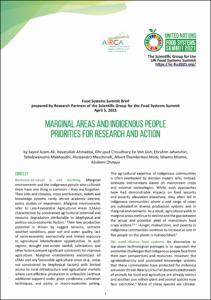Azam-Ali, Sayed; Ahmadzai, Hayatullah; Choudhury, Dhrupad; Goh, Ee Von; Jahanshiri, Ebrahim; Mabhaudhi, Tafadzwanashe; Meschinelli, Alessandro; Modi, Albert Thembinkosi; Nhamo, Nhamo; Olutayo, Abidemi: Marginal areas and indigenous people – Priorities for research and action : Food Systems Summit Brief prepared by Research Partners of the Scientific Group for the Food Systems Summit April 5, 2021.
Online-Ausgabe in bonndoc: https://doi.org/10.48565/fd4f-rk35
Online-Ausgabe in bonndoc: https://doi.org/10.48565/fd4f-rk35
@article{handle:20.500.11811/9138,
doi: https://doi.org/10.48565/fd4f-rk35 ,
author = {{Sayed Azam-Ali} and {Hayatullah Ahmadzai} and {Dhrupad Choudhury} and {Ee Von Goh} and {Ebrahim Jahanshiri} and {Tafadzwanashe Mabhaudhi} and {Alessandro Meschinelli} and {Albert Thembinkosi Modi} and {Nhamo Nhamo} and {Abidemi Olutayo}},
title = {Marginal areas and indigenous people – Priorities for research and action : Food Systems Summit Brief prepared by Research Partners of the Scientific Group for the Food Systems Summit April 5, 2021},
publisher = {Center for Development Research (ZEF) in cooperation with the Scientific Group for the UN Food System Summit 2021},
year = 2021,
month = apr,
note = {Business-as-usual is not working. Marginal environments and the indigenous people who cultivate them have one thing in common – they are forgotten. This policy brief aims to tackle down challenegs and opportunities of indigenous food systems and knowledge. Current agricultural policies promote staple crops for mainstream agriculture in favourable areas. This has been at the expense of indigenous and underutilized crops, many of which are well adapted to hostile environments and yield nutritious products. To achieve sustainable livelihoods, indigenous people in marginal areas need game-changer technologies in which they are the agents of innovation.},
url = {https://hdl.handle.net/20.500.11811/9138}
}
doi: https://doi.org/
author = {{Sayed Azam-Ali} and {Hayatullah Ahmadzai} and {Dhrupad Choudhury} and {Ee Von Goh} and {Ebrahim Jahanshiri} and {Tafadzwanashe Mabhaudhi} and {Alessandro Meschinelli} and {Albert Thembinkosi Modi} and {Nhamo Nhamo} and {Abidemi Olutayo}},
title = {Marginal areas and indigenous people – Priorities for research and action : Food Systems Summit Brief prepared by Research Partners of the Scientific Group for the Food Systems Summit April 5, 2021},
publisher = {Center for Development Research (ZEF) in cooperation with the Scientific Group for the UN Food System Summit 2021},
year = 2021,
month = apr,
note = {Business-as-usual is not working. Marginal environments and the indigenous people who cultivate them have one thing in common – they are forgotten. This policy brief aims to tackle down challenegs and opportunities of indigenous food systems and knowledge. Current agricultural policies promote staple crops for mainstream agriculture in favourable areas. This has been at the expense of indigenous and underutilized crops, many of which are well adapted to hostile environments and yield nutritious products. To achieve sustainable livelihoods, indigenous people in marginal areas need game-changer technologies in which they are the agents of innovation.},
url = {https://hdl.handle.net/20.500.11811/9138}
}






